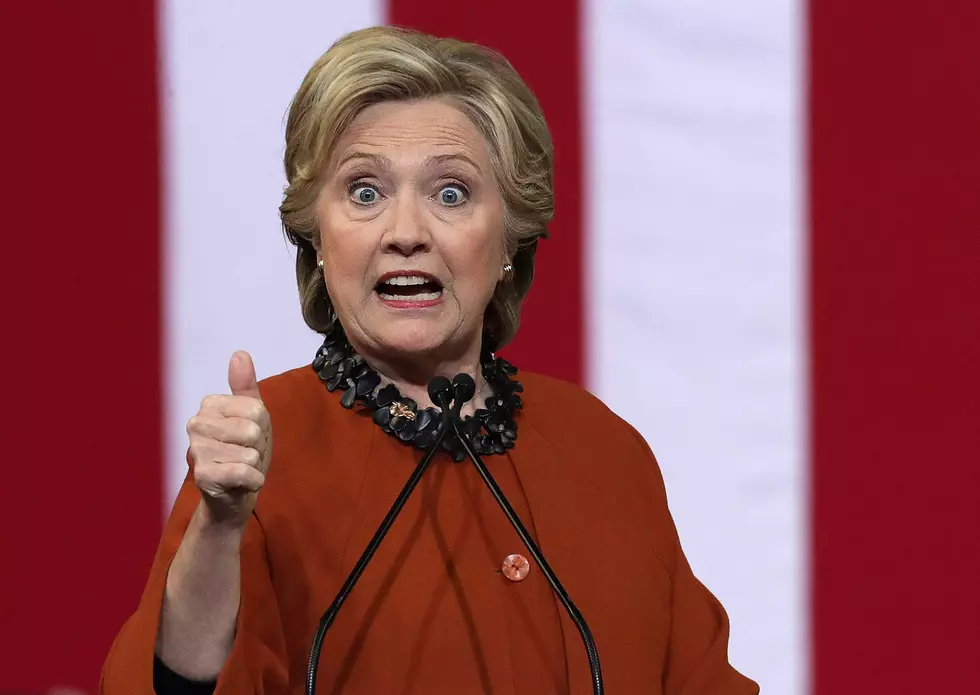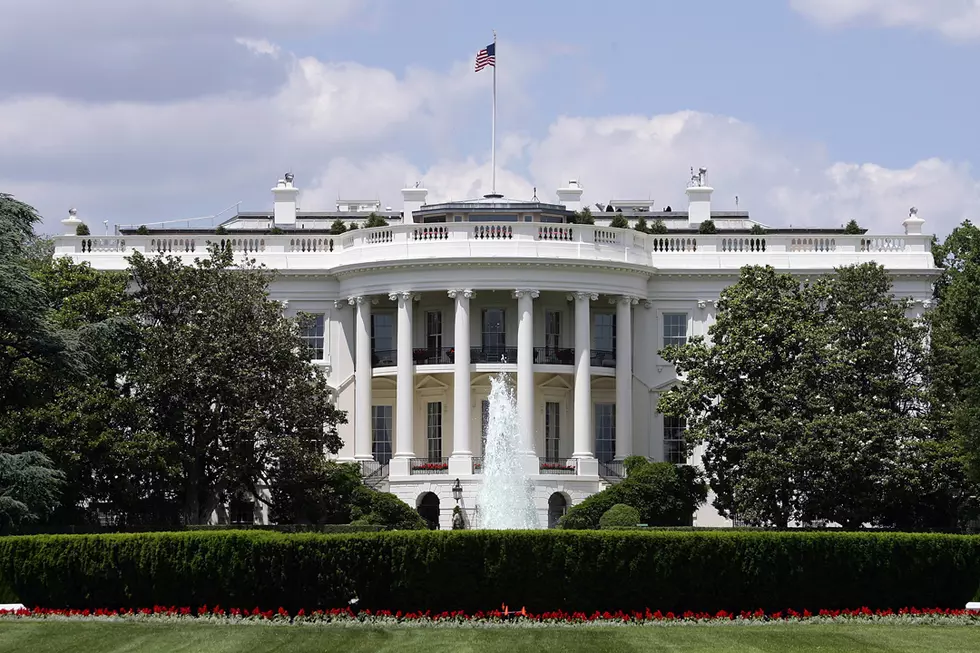
Chad’s Morning Brief: Democrats Look Past Obama and Wonder About Future, Rand Paul’s Republican Party
Here is your Morning Brief for the morning of February 18, 2014. Give me your feedback below and tune in to The Chad Hasty Show for these and many more topics from 8:30 to 11am. Remember, you can listen online at KFYO.com or on your iPhone/Android with the radioPup App.
Democrats Wonder About Future
The closer we get to 2016 the more articles like this from the Washington Post I expect to see. While Republicans have been divided for years now, a new divide is starting to appear within the Democratic Party. While Hillary Clinton is the media's pick to win the Democratic nomination, some Democrats wonder if she is populist or not.
The Democratic Party is much more liberal than it was when Bill Clinton was President. You could start seeing a fight inside the Democratic Party about just how far left they want to be.
With three years remaining in the presidency of Barack Obama, the party he has led since mesmerizing members with his 2008 campaign has begun debating a post-Obama future.
Though more united than Republicans, Democrats nevertheless face simmering tensions between the establishment and a newly energized populist wing, led by the unabashed liberalism of New York Mayor Bill de Blasio and the fiery rhetoric of Massachusetts Sen. Elizabeth Warren.
The schisms are as much stylistic as substantive. But however defined, they offer a challenge to the party’s next leader, whether former Secretary of State Hillary Rodham Clinton, Vice President Joe Biden or any number of lesser-knowns who await a decision by Clinton before making their own.
All will have to grapple with this reality. The Democratic Party, by various measures of public opinion, has moved to the left in the past decade. But that does not necessarily mean that progressives have become the party’s dominant force or that the policies and messages they advocate can carry the day in a national election.
“Nothing moves a party more than copying successful people,” said Andrew Stern, the former president of the Service Employees International Union, as he pointed to the prominence of de Blasio and Warren. “I think the party tends to drift in the direction of its successful innovators.”
But Stern cautioned that the bigger test of who holds power inside the party is proving those ideas can attract voters beyond staunchly liberal states or cities.
“It is fair to say that more liberal places find politicians first who are more willing to step out on these issues,” he said. “But it is not a shift until it’s seen to work in Minnesota or Wisconsin or New Mexico or Arizona.”
Adam Green, a co-founder of theProgressive Change Campaign Committee, a grass-roots group that has helped propel Warren’s rise, said the populist wing of the party is clearly ascendant.
“There’s been consensus in both parties since the 1990s Clinton days where big corporations run the show and both parties suck up to them and everything else falls into place from there,” he said. “The Elizabeth Warren wing really believes in challenging the current state of who has power and who has influence.”
But other Democrats counter that the party must be careful about how it shapes its message and policies. Delaware Gov. Jack Markell, who came up through the centrist ranks of the party, noted that in the past when the progressive or liberal wings of the party were flourishing — he cited George McGovern’s candidacy in 1972 and Walter F. Mondale’s in 1984 — the party suffered major defeats.
“The idea of us as a party not continuing to understand where the people of the country are — we ignore all of that at our own peril,” he said.
How big a shift?
The Democratic Party of 2014 is one shaped both by the influences of former president Bill Clinton’s New Democrat ideas and the more liberal policy initiatives and cultural changes that have defined Obama’s presidency.
Obama’s tenure has intensified the debate over whether the Democrats are more ideologically liberal than they were a decade or two ago.
Conservatives see a president who has brought government much deeper into the health-care system, whose economic policies significantly increase the deficit and whose bent is for more government and more spending. But progressives see a president who lacks the populist edge they say the times demand and who has fallen short of the promise of his first campaign.
By many measures, the party is certainly seen as more liberal than it once was. For the past 40 years, the American National Election Studies surveys have asked people for their perceptions of the two major parties. The 2012 survey found, for the first time, that a majority of Americans describe the Democratic Party as liberal, with 57 percent using that label. Four years earlier, only 48 percent described the Democrats as liberal.
(In the same survey, 59 percent said they saw the Republicans as conservative, up from 52 percent four years earlier.)
Gallup reported last month that 43 percent of surveyed Democrats identified themselves as liberal, the high water mark for the party on that measurement. In Gallup’s 2000 measures, just 29 percent of Democrats labeled themselves as liberals.
Still, liberals are a plurality of the Democratic Party, not a majority, which is strikingly different from the Republican Party, where Gallup found that 70 percent identified themselves as conservative.
Joel Benenson, who was Obama’s lead pollster in 2008 and 2012, said Democrats are and always have been a progressive party, but they have balanced those ideas with practical policies that have attracted voters.
Asked about claims by some grass-roots progressives that the party is now Warren’s party, he said, “I don’t know what it means. Do you think that Harry Reid thinks it’s an Elizabeth Warren party? Do you think Chuck Schumer thinks it’s an Elizabeth Warren party? Do you think Hillary Clinton thinks it’s an Elizabeth Warren party? Do you think Barack Obama thinks it’s an Elizabeth Warren party? Or Nancy Pelosi?”
Democrats are most united on cultural and social issues, and it is here where the party has most obviously moved to the left, particularly on same-sex marriage and even the legalization of marijuana. But the party’s shift reflects overall changes in public attitudes that have kept the Democrats within a new political mainstream on these issues.
You can read the whole article by clicking the link above. I expect to see the Democrats fight over the future of the party. I still expect Clinton to get the nod, but it may not be as easy as many think.
Paul's GOP
According to POLITICO, Rand Paul has a vision for the GOP that is more inclusive.
The Kentucky Republican has many more sleep-deprived moments in store as he prepares for a near-certain 2016 presidential bid. On an early February political swing through his native Texas, where Paul was joined by a POLITICO reporter, the contradictions and challenges that would define such a run were on vivid display — as was Paul’s belief that his blend of libertarian-infused conservatism could forge an entirely new path to the White House.
In an extensive in-flight interview, the first-term senator outlined his vision for a more inclusive GOP — only to meet a frosty response hours later when he spoke favorably about immigration to a roomful of people enamored of the tea party’s luminary of the moment, Sen. Ted Cruz.
Paul didn’t talk much during the trip about his roots as the son of an ex-congressman and libertarian folk hero. But Texans at every turn brought up his father, the highly polarizing former Rep. Ron Paul, from whom Rand Paul knows he must stake out a separate identity to have any shot at the GOP nomination.
And as Paul argued that the GOP needs a 2016 standard-bearer with broader appeal than its recent nominees, Mitt Romney and John McCain, he did not evince Barack Obama’s ability to move a crowd, George W. Bush’s everyman relatability or Bill Clinton’s love of the game.
At the same time, Paul made clear his ambition to remake the Republican Party by drawing support from constituencies that have voted reliably Democratic. Just as Ronald Reagan drew working-class Democrats into the GOP fold and Bill Clinton pulled his party to the political center, Paul has a vision of that magnitude in mind for his party.
“The country’s a mess, and I think there needs to be a program that Republicans put forward, and also there needs to be a messenger who can actually win,” Paul said, in perhaps his most overt remarks to date about what a presidential bid would look like. “And I’m concerned that if we put forward the same sort of candidate again, that we won’t be successful.”
Sporting a gray suit, red tie and cowboy boots, Paul said ideas that fall into the “libertarian-slash-Republican” camp “are a bit different from what we’ve done in the past” and could expand the GOP tent. Those proposals go beyond his well-known problems with National Security Agency surveillance, which led him to file a class-action lawsuit against the agency last week. Drug policy reforms, Paul said, would particularly resonate in minority communities that have largely shut out Republicans.
And opposing indefinite detention of detainees, he said, would strike a chord with groups that historically have been persecuted.
“I think that our message … has great appeal if you are part of any kind of group that’s ever been mistreated in history,” he said. “That could be African-Americans, Jewish-Americans, Japanese-Americans, all of which, at times in our history, haven’t been treated as they should be.”
Paul rode the tea party wave to an upset win in 2010, and he developed a reputation during his first few years in the Senate as a persistent thorn in the side of GOP leaders. But over the past several months, while his policy positions haven’t shifted much, he has refrained from leading the rhetorical charge against establishment figures in his own party. A case in point: It was Cruz who spearheaded the fight that led to the government shutdown, while Paul largely kept his head down and even invited Democrats to a coffee summit to smooth things over.
Paul has also made a point to visit minority communities and has been among the most aggressive in his party about promoting outreach to nontraditional GOP voting blocs.
At an event in Houston that night, Paul bluntly summarized the political perils of not broadening the GOP base — especially in a place like Texas, which is nearly 40 percent Hispanic. Speaking to a crowd of more than 600 high-dollar donors, party activists, and state legislators and candidates at an otherwise festive Harris County GOP dinner, Paul warned that “Texas is going to be a Democrat state within 10 years if we don’t change.”
Though he didn’t support the so-called Gang of Eight immigration compromise, Paul but has since made clear he would be open to reform that goes beyond securing the borders. “That means we evolve,” he said. “It doesn’t mean we give up on what we believe in, but it means we have to be a welcoming party.”
You can read the full story by clicking the link above.
Other Top Stories:
These and many more topics coming up on today’s edition of The Chad Hasty Show. Tune in mornings 8:30-11am on News/Talk 790 KFYO, streaming online at kfyo.com, and now on your iPhone and Android device with the radioPup App. All guest interviews can be heard online in our podcast section after the show at kfyo.com.
More From News/Talk 95.1 & 790 KFYO







![Chad’s Morning Brief: Is Hillary Clinton Going To Run For President Again? [WATCH]](http://townsquare.media/site/192/files/2017/09/GettyImages-846077654.jpg?w=980&q=75)

